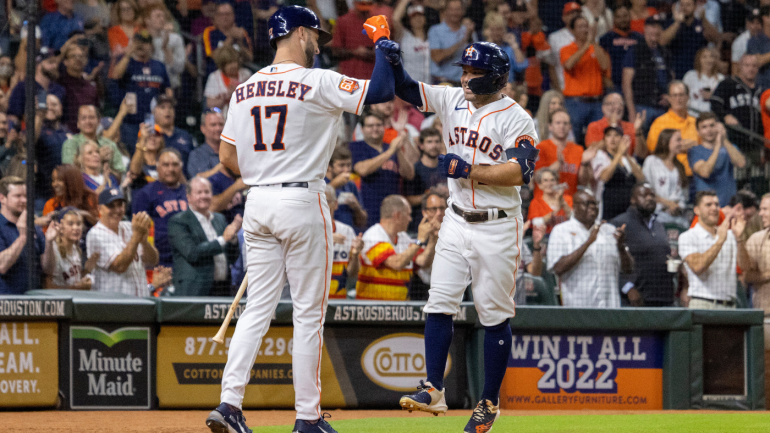Jose Altuve, the second baseman for the Houston Astros, fractured his thumb on Saturday while playing for Venezuela in the World Baseball Classic loss to Team USA. He will miss the beginning of the 2023 MLB season for the Houston Astros. Altuve sustained the injury when a fastball from Daniel Bard struck him in the hand. He will have surgery to repair his digit in the following days.
A return date for Altuve was not provided by the Astros. According to the injury database maintained by Baseball Prospectus, a hitter’s typical recovery period from a fractured thumb is 34 days, or roughly five weeks. Naturally, recovery times might differ depending on a wide range of elements, such as the severity and the team’s circumstances. The Astros may adopt a more cautious tack because they want to make sure Altuve is healthy and hearty when he returns.
The Astros now have the difficult chore of replacing Altuve’s productivity at the top of their lineup with him potentially out until May at the earliest. He played in 141 games and had a batting line of.300/.387/.533 (160 OPS+) with 28 home runs. Baseball Reference calculated that his efforts were worth 5.1 Wins Above Replacement. In turn, he achieved his fifth-place finish in the voting for the American League Most Valuable Player Award since his triumph in 2017.
What choices does Dana Brown, general manager of the Astros, have? We’ve highlighted some viable options below, both inside and externally.
1. The internal choices
Giving the keystone to one or two existing Astros players is the most likely and direct course of action for Brown and the team. The top prospects are David Hensley and Mauricio Dubón.
Hensley made his big-league debut last season and is listed at an unusually tall 6-foot-6 for a middle baseman. He batted.345/.441/.586 in 16 games. He has demonstrated a good sight at the plate and a solid line-drive stroke. Hensley will turn 27 just before Opening Day, so he isn’t particularly young in the traditional sense, but his lack of experience makes him a possible long-term member of the squad if he can demonstrate that his contact-driven approach can hold up against MLB-caliber pitching. Here, there is league-average upside.
First career home run for David Hensley! pic.twitter.com/QzZfS3pGee
— Houston Astros (@astros) September 28, 2022
The 28-year-old Dubón has moved across the league and the diamond. He was acquired by Houston in a modest trade with the San Francisco Giants last May, and he played center field for the Astros the most of the time. With a 67 OPS+ in 452 plate appearances over the previous two seasons, Dubón has displayed little life at the plate. He would seem to be better used in a super-utility capacity, but in this case, he serves as a passable Hensley insurance policy.
There aren’t many more viable candidates for the Astros in their organization. Joe Perez and Rylan Bannon are the only other infielders on the 40-man roster. The most suitable alternative is minor-league veteran Dixon Machado, who has played in more than 170 big-league games.
2. On the trade market
During this time of the year, it’s challenging to make significant transactions since no team wants to offend their supporters or clubhouse. In a sense, the Astros would have reduced goals, which is excellent news. They don’t need a long-term fit or a star; they just need someone who can start the season off strong before fading into the background.
The Astros would be wise to search the market for guys who have no other minor-league choices. Clubs are hesitant to lose players to waiver losses, therefore they might be more willing to make a trade in order to gain something in return. However, the class of option-free infielders for this year isn’t particularly impressive. Maybe Zach McKinstry could be traded by the Chicago Cubs?
The Astros don’t appear like they would be eager to take on bad debt from an undesirable contract in this circumstance. To put it another way, don’t count on them to save the Cubs from David Bote’s situation or the St. Louis Cardinals from Paul DeJong’s.
The Astros have one more option they can pursue in the coming days.
3. In free agency
It’s mid-March, so it’s to be expected that there aren’t many great options available right now. The name José Iglesias is the most appealing. Despite having a 90 OPS+ in 118 games with the Colorado Rockies last year, he is now unsigned. But, he would be significantly underprepared, forcing some time in the minors for him to get over the rust.
The Astros might observe which players make the most of their situation as Article XX(B) free agents before making a decision. For those who are unfamiliar, people who sign minor-league contracts as Article XX(B) free agents are allowed to opt out of their contracts at various points throughout the season, including before Opening Day, if they are not assigned to their current team’s active roster. César Hernández (Tigers), Rougned Odor (Padres), and Ehire Adrianza are three infielders who might be able to take advantage of that clause (Braves).
Are any of the aforementioned athletes superior to what Hensley might be? Most likely not, given there are frequently valid reasons for that player class to accept a minor-league contract at that stage of their careers.
Yet, if the chance presents itself, there is much to be said for incorporating a second backup strategy; after all, what if Hensley sustains an injury prior to Altuve’s return? The Astros owe it to themselves to look into and see what is available in the market. Even if the alternatives turn out to be unappealing, they may find comfort in the knowledge that Altuve will return eventually and that the rest of their squad is strong enough to maintain their record until their second baseman makes their next cut.
